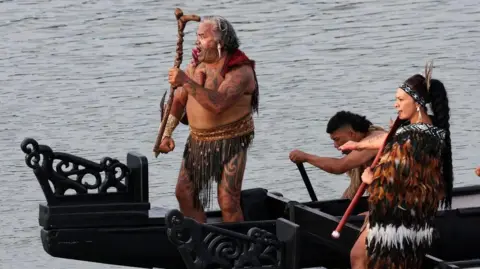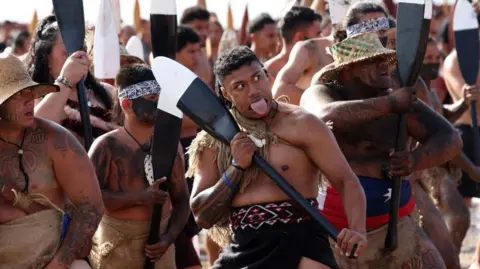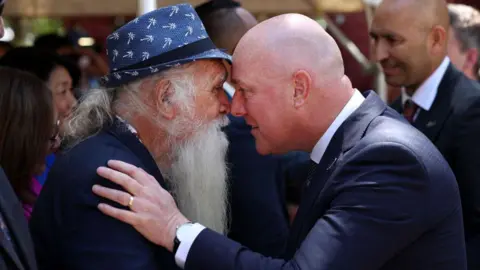Waitangi Day: Thousands gather in NZ with Māori rights in focus
 Getty Images
Getty ImagesThousands of people have attended events in Waitangi in northern New Zealand, to celebrate the country's national day amid a debate over the future of its founding document.
Waitangi Day marks the first signing of New Zealand's Treaty of Waitangi or Te Tiriti o Waitangi in Māori between the British Crown and Māori chiefs in 1840.
Prime Minister Christopher Luxon - who attended an event in the South Island - described the day as an opportunity to reflect on New Zealand's past as it charts its future.
But this year's events come at a time of increased tensions, as the government pursues policies considered by some to be anti-Māori.
 Getty Images
Getty ImagesThe introduction of a bill which sought to reinterpret the 185-year Waitangi treaty by a minority partner in the country's ruling coalition has also caused anger and dismay.
Although Luxon said that the bill would not pass into law, it brought protesters out in record numbers in a hikoi or peaceful march last November.
And on Thursday, as peaceful rallies took place nationwide, some community leaders voiced their dismay.
At a dawn ceremony in the Bay of Islands, Methodist leader Te Aroha Rountree likened the Crown-Māori relationship to a marriage, accusing the Crown of filing "for divorce" while Māori remained "blissfully unaware".
At a protest later in the day in Wellington, Anaru Ryall - an activist from Tiriti Action Group Poneke - accused the government of "attacking tangata whenua [Indigenous people] on all fronts," and eroding their rights.
Luxon's decision not to travel to Waitangi and instead spend the day with the South Island's largest tribe - or iwi in Māori - Ngāi Tahu, also drew a mixed response.
His political opponents accused him of cowardice, while Ngāi Tahu said it welcomed the prime minister's decision to celebrate with them and that it was a time to "reflect on our shared history...and strengthen the relationships between tangata whenua [Māori] and the Crown, for the benefit of all our communities".
Speaking to large crowds at Akaroa's Ōnuku Marae, Luxon praised New Zealanders for their ongoing ability to "heal past grievances, and move forward, adding that it was "something many other countries around the world have failed to achieve".
"The Crown-Māori relationship will continue to be strong and built on respect and collaboration."
What is the treaty of Waitangi?
 Getty Images
Getty ImagesThe Treaty of Waitangi was signed between many, but not all, Māori tribes and the British Crown at Waitangi on 6 February 1840 - giving both parties certain rights and privileges.
For Māori, this includes retaining chieftainship over their lands and resources, but differences between the Māori and English versions of the treaty have left it open to interpretation.
Nevertheless, the promise to protect indigenous land rights was repeatedly broken and the economic and cultural impacts of this, coupled with racial discrimination, has led to an inequality that is still being addressed today.
It is in this context that the anniversary of the signing of the treaty has come an important day for discussions about the state of relations between Māori and the state.
A tense backdrop
This year's anniversary comes amid ongoing scrutiny of the Treaty Principles Bill.
The minister who has been championing the proposal - Act Party leader David Seymour - has attended events, despite being asked not to by his hapū (sub-tribe).
Proponents of the bill say it will promote equality among New Zealanders, but those against it say it is divisive and will further disadvantage Māori.
Concern about the bill is so high that a national forum representing several iwi (Māori tribes) recently wrote a letter to King Charles - New Zealand's head of state - asking for his help.
"We seek your intervention to ensure that the government does not diminish the Crown's honour," the open letter reads.
"Please remind them to respect their responsibility to act as an honourable partner on your behalf."
While it is unlikely the bill will pass - with Luxon and his majority National Party vowing to not back it at its second reading later this year - some of those who have participated in the public hearings about it say its very existence is an insult.
They include former justice minister Kiritapu Allan, who described the proposed legislation as an "abomination".
"This is a bill that is about scrubbing us [Māori] from history," she said.
Others have supported it. Economist Ananish Chaudhuri said the conversation about enshrining the Treaty principles in law was needed "if New Zealand is to remain a multi-ethnic and multi-cultural nation".
He also spoke out against a situation in which different cultures in New Zealand are treated differently, saying his birth nation of India was a "cautionary tale".
Other steps the government has taken that have caused anger include the dissolution the Māori Health Authority - which was set up under the last Labour government to try and create greater health equality - and the removal of Māori names from government departments.
